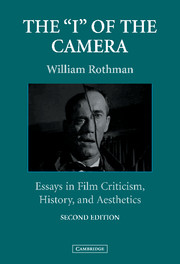Book contents
- Frontmatter
- Contents
- Foreword to the Second Edition
- Preface to the First Edition
- Acknowledgments
- Notes on the Essays
- The “I” of the camera
- 1 Hollywood Reconsidered: Reflections on the Classical American Cinema
- 2 D. W. Griffith and the Birth of the Movies
- 3 Judith of Bethulia
- 4 True Heart Griffith
- 5 The Ending of City Lights
- 6 The Goddess: Reflections on Melodrama East and West
- 7 Red Dust: The Erotic Screen Image
- 8 Virtue and Villainy in the Face of the Camera
- 9 Pathos and Transfiguration in the Face of the Camera: A Reading of Stella Dallas
- 10 Viewing the World in Black and White: Race and the Melodrama of the Unknown Woman
- 11 Howard Hawks and Bringing Up Baby
- 12 The Filmmaker in the Film: Octave and the Rules of Renoir's Game
- 13 Stagecoach and the Quest for Selfhood
- 14 To Have and Have Not Adapted a Film from a Novel
- 15 Hollywood and the Rise of Suburbia
- 16 Nobody's Perfect: Billy Wilder and the Postwar American Cinema
- 17 The River
- 18 Vertigo: The Unknown Woman in Hitchcock
- 19 North by Northwest: Hitchcock's Monument to the Hitchcock Film
- 20 The Villain in Hitchcock: “Does He Look Like a ‘Wrong One’ to You?”
- 21 Thoughts on Hitchcock's Authorship
- 22 Eternal Véritées: Cinema-Vérité and Classical Cinema
- 23 Visconti's Death in Venice
- 24 Alfred Guzzetti's Family Portrait Sittings
- 25 The Taste for Beauty: Eric Rohmer's Writings on Film
- 26 Tale of Winter: Philosophical Thought in the Films of Eric Rohmer
- 27 The “New Latin American Cinema”
- 28 Violence and Film
- 29 What Is American about American Film Study?
- Index
12 - The Filmmaker in the Film: Octave and the Rules of Renoir's Game
Published online by Cambridge University Press: 05 June 2012
- Frontmatter
- Contents
- Foreword to the Second Edition
- Preface to the First Edition
- Acknowledgments
- Notes on the Essays
- The “I” of the camera
- 1 Hollywood Reconsidered: Reflections on the Classical American Cinema
- 2 D. W. Griffith and the Birth of the Movies
- 3 Judith of Bethulia
- 4 True Heart Griffith
- 5 The Ending of City Lights
- 6 The Goddess: Reflections on Melodrama East and West
- 7 Red Dust: The Erotic Screen Image
- 8 Virtue and Villainy in the Face of the Camera
- 9 Pathos and Transfiguration in the Face of the Camera: A Reading of Stella Dallas
- 10 Viewing the World in Black and White: Race and the Melodrama of the Unknown Woman
- 11 Howard Hawks and Bringing Up Baby
- 12 The Filmmaker in the Film: Octave and the Rules of Renoir's Game
- 13 Stagecoach and the Quest for Selfhood
- 14 To Have and Have Not Adapted a Film from a Novel
- 15 Hollywood and the Rise of Suburbia
- 16 Nobody's Perfect: Billy Wilder and the Postwar American Cinema
- 17 The River
- 18 Vertigo: The Unknown Woman in Hitchcock
- 19 North by Northwest: Hitchcock's Monument to the Hitchcock Film
- 20 The Villain in Hitchcock: “Does He Look Like a ‘Wrong One’ to You?”
- 21 Thoughts on Hitchcock's Authorship
- 22 Eternal Véritées: Cinema-Vérité and Classical Cinema
- 23 Visconti's Death in Venice
- 24 Alfred Guzzetti's Family Portrait Sittings
- 25 The Taste for Beauty: Eric Rohmer's Writings on Film
- 26 Tale of Winter: Philosophical Thought in the Films of Eric Rohmer
- 27 The “New Latin American Cinema”
- 28 Violence and Film
- 29 What Is American about American Film Study?
- Index
Summary
This chapter has two parts. First, it sketches a reading of The Rules of the Game that focuses on the figure of Octave. Then it examines the significance of The Rules of the Game within the context of Renoir's work. In brief, the claim of the first part is that Octave represents the film's author, serves as the filmmaker's surrogate in his intervention in the world of the film (the most direct possible point to Renoir's gesture of choosing to play the part of Octave himself). Octave's role constitutes a paradigm for the role Renoir conceives himself as playing as creator of films like The Rules of the Game. In this way, Renoir's conception of the creation of his art – a conception manifestly the subject of Renoir's late work (for example, the trilogy The Golden Coach, French Can-Can, and Eléna et les Hommes, and The Little Theater of Jean Renoir) – is inscribed within the The Rules of the Game. The film's delineation of Octave's role, its establishment of a certain relationship between the camera and the world it frames, and its story are integrally connected. The Rules of the Game is an acknowledgment by Renoir of the conditions of his own art.
The second part of this chapter argues that the way The Rules of the Game frames this acknowledgment is crucial to its significance in the context of Renoir's work.
- Type
- Chapter
- Information
- The 'I' of the CameraEssays in Film Criticism, History, and Aesthetics, pp. 122 - 138Publisher: Cambridge University PressPrint publication year: 2003



